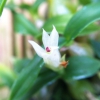|
|
|
|
| Register Yourself at Meyers Conservatory |
To register yourself with the Meyers Conservatory web site, please click the button
below and follow the instructions. You may just make a simple registration with your
email address and a password, but to use the advanced features like the Wish List
you should follow the registration process all the way into the User Information Page
where you can specify plants you are interested in and decide what kind of notifications
you will get.
|
|
|
|
|
| |
Flasks of
Dendrobium parvulum subsp. huliorum 'Crabass' -spontaneous |
|
| |
|
|
| |
| Number: |
TN8220 |
| Name: |
Dendrobium parvulum subsp. huliorum 'Crabass' -spontaneous
|
| Type: |
spontaneous (What's that?) |
|
Seed Donor: |
Sleepy Hollow Orchids
|
|
Click to Enlarge

Pod Parent Flower |
Click to Enlarge

Pod Parent Blooming Plant |
|
|
|
| |
For additional origin/habitat information supplied courtesy of
Charles and Margaret Baker, see further below, near the bottom of this page.
|
Temperatures we attempt to use in the lab & greenhouse:
| For Species: |
|
Spring, Summer, Autumn: days average 83°F, nights 60°F; best fit is Intermediate 83-60°F
(Source:
C. Hill pers comm) |
| For Species: |
|
Winter: days average 75°F, nights 58°F; best fit is Cool-Intermediate 75-58°F
(Source:
C. Hill pers comm) |
|
About the name...
| Etymology of |
Dendrobium |
|
From Greek "dendron" tree and "bios" life.
(Source:
Pridgeon 1992) |
| Pronunciation of |
Dendrobium |
|
den-DRO-bee-um
(Source:
Pridgeon 1992) |
|
If you would like to direct someone to this web page, please copy and paste this URL into your email:
http://troymeyers.com/d?018220
| Flask Information |
| Availability: |
Seed not viable- failed. We were not able to make any flasks. |
| You should: |
Consider placing a "Notify Retries" Request, and if an identical pollination (the same parents) is done again, we'll let you know. |
|
You might also want to:
|
View the seed assay for this item.
View items of the same species.
View items of the same genus.
|
| Ordering Information |
| You are not currently logged in. |
|
You must be a registered user and be logged in to reserve a flask or place a notification request. Please log in:
|
|
| Register Yourself at Meyers Conservatory |
To register yourself with the Meyers Conservatory web site, please click the button
below and follow the instructions. You may just make a simple registration with your
email address and a password, but to use the advanced features like the Wish List
you should follow the registration process all the way into the User Information Page
where you can specify plants you are interested in and decide what kind of notifications
you will get.
|
|
|
|
|
|
|
|
| |
The origin/habitat information below is supplied courtesy of Charles and Margaret Baker
The following information is based on the name of the plant provided by the donor, and assumes that the name is correct. If the plant has been misidentified, then the following information may not be correct.
This text is copyrighted by the Bakers and may not be reproduced without permission.
ORIGIN/HABITAT: Widespread. D. delicatulum subsp. delicatulum grows in
Vanuatu, Bougainville, the Solomon Islands, Fiji, Ponape, and northern
Papua New Guinea. It is epiphytic on the mossy, horizontal branches of
mistforest trees at 1950-8700 ft. (600-2650 m).
D. delicatulum subsp. huliorum grows in eastern New Guinea at 4600-5900
ft. (1400-1800 m).
D. delicatulum subsp. parvulum grows on Mt. Klabat, on the Minahassa
Peninsula in northern Sulawesi (Celebes), at 2950-3950 ft. (900-1200 m).
This variety also grows on Waigeo Island, just off the tip of western New
Guinea. The average lows for this variety are 4-8F (2-4C).warmer than
indicated in the following climate table, but average highs are similar.
More about this information and the Bakers...
|
|
|
| |
|
|
|